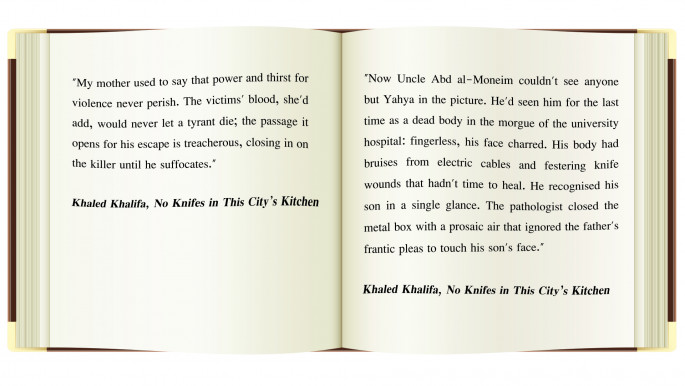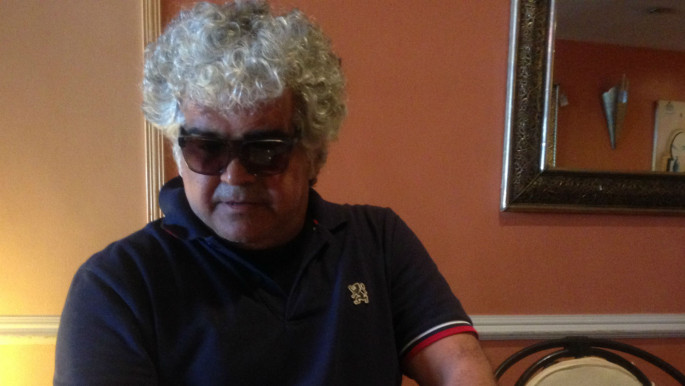Khalifa: lover of two cities, chronicler of a country
In Damascus, they tell stories about him, the writer. Khaled Khalifa, they say, clings to life in a city that at night is now mostly left to the ghosts.
They see him, one of Syria’s best known writers, as he walks empty streets, alone or with friends, passing mostly stray dogs and with the sound of war in the distance. On occasion, the 50-year-old will frequent one of the few nightclubs that still stays open. Sometimes, around 2 am, he stands up and gestures to the few other guests. “Solo, shabab, solo,” he will say. Then he dances alone.
The award winning writer’s fourth novel No Knives in This City’s Kitchen is due out in English after the turn of the year. It marks another chance for non-Arabic readers to acquaint themselves with a mischievous chronicler of life in Syria whose books are banned in his own country even as they pick up awards elsewhere.
“Their tears welled up as they recalled the virtues of our Father, the Leader, Commander of War, Sage of the Arabs, the greatest athlete, the greatest judge, the greatest engineer,” is how he describes the reaction to the death of Hafez al-Assad, the late Syrian president, in No Knives in This City’s Kitchen. “Their grief almost choked them when they failed to say he was the greatest god.”
| Don't listen to any advice. Just write |
His is an impish spirit. In April, he was shortlisted for the International Prize for Arabic Fiction Award, and one of his friends took bets on his Facebook page whether he would turn up for the ceremony in a t-shirt rather than a suit and tie. Confounding even his friends, he chose a short-sleeved shirt. No tie.
Some describe his novels as epic. For many he, like no one else, describes the anatomy of living under a totalitarian regime, his characters entangled in the omnipresent Baath party from which there is no escape. He describes how Assad rule brought Syrian lives to the brink of collapse, destroying families with violence, detention and killing.
He is a chronicler. His third book, In Praise of Hatred, first published in 2006 and translated into English, documents the period of the late 1970s and 1980s and the Muslim Brotherhood’s rise in Syria, which was eventually brutally put down in Hama in 1981. No Knives in This City’s Kitchen documents the more recent history of Syria, though stops with the death of Hafez al-Assad and long before the uprising against his son Bashar started in 2011.
Prohibition
He treats the prohibition on his books in Syria with humour. “The head of censorship is a friend. I sometimes call him and say: ‘So when will my books be available in the libraries?’ He just tells me I have big dreams.”
In any case, he says, censorship is no longer a problem. “You can’t do it today. Thanks to the internet you cannot ban a book.” When someone shared a link to a pdf of his latest book on his Facebook page wondering if Khalifa would be upset, he clicked ‘like’ almost immediately. “Why would I be upset? Let the people read,” he says.
But if one problem has gone, another, much greater, has reared its head.
“Now we have to talk about blood, about hundreds of thousands of dead in Syria. Censorship is nothing for us,” he says.
He has no illusions that the past is gone. “This is a war-life, revolution-life. Everything is different in the city.” He adds: “War [in Syria], like the Second World War in Europe changed everything. It is like an earthquake.”
But there is no nostalgia. In a recent Facebook status he raged against past “fake stability” that only secured the “interests of mafias”. “We didn’t achieve citizenship. We didn’t build reputable universities. We didn’t do anything.”
Talk about blood
 |
And he still believes in the Arab Spring even if it came late. “We should have been with the uprisings of Eastern Europe, but our regimes are different. Latin America has been transformed, Eastern Europe too.”
As his city changed so did Khalifa’s routine. He recently attempted to work from home because the many checkpoints in Damascus meant his commute to the centre and his office downtown could be as long as three hours. But it didn’t work. From his home in Masaken Barzeh he can overlook Damascus. Every day, he says, “I heard the bombing outside. After a few days, I was afraid to leave the house.”
He decided, he says, that he needed to get out of the house. Now, he mostly tries to write from the well-known Pages coffee shop in Damascus, which is owned by friends.
The bustle of does not disturb him. It is a trait Mohamad Salah Omri, a friend as well as professor of Modern Arabic Literature at Oxford University, says baffles him whenever he sees Khalifa writing in a noisy coffee house. But it attests to his approach to writing.
There is no pomposity or romance in his attitude to his craft. He describes himself simply as a professional writer. “I write for 6-7 hours a day. I write in coffee shops in Damascus. I don’t need many things: good coffee, a good chair, a good table,” he says.
According to Omri, Khalifa both continues and interrupts the traditional Arabic novel.
“In his writing, there is an ambition to have the sweep of great novelists like Abd al-Rahman Munif and Naguib Mahfuz. Yet, he writes with an irony and audacity rarely found in either.”
al-khal
 |
|
| [Photo courtesy of Syria Speaks] |
And he remains humble despite growing recognition. In 2013, he won the prestigious Naguib Mahfouz Medal for Literature, awarded by the American University in Cairo. But the youth still call him al-khal, “uncle”, and he is known to be supportive of young talent even if reluctant to offer advice.
“I tell them: Don’t listen to any advice. Just write.”
His life and work revolves around two cities: that of his birth, Aleppo, and Damascus where he lives. He is, he says, “a lover of two cities”. All his novels are set in Aleppo, but, after 25 years, he refuses to leave Damascus. “I’m afraid of leaving my country. But for me it is not a heroism. I’m living in my house, with my people and in my city.”
And he clings to the things he loves. An avid cook, Khalifa enjoys entertaining, even for those who don’t know him well. Bilal Zaiter, a Syrian Ph.D. candidate in Paris, found himself thus invited after one recent night out in Damascus. Zaiter has read none of Khalifa’s books. But he remembers the food fondly. “He made mulakhiya.” Not surprisingly, Khalifa says if he ever stops writing, he plans to be a cook. “I will make TV shows about cooking and it will be a success,” he says smiling.
Above all, he clings to his city. On New Year’s Eve, Khalifa and two friends walked the empty streets, “trying to invent exhilarating projects: to have a coffee, maybe even a cappuccino and then with excitement to march to a shawarma stand, to later search for a place to have a tea”.
“There was no one on the streets,” he later wrote. “The city is empty and lonesome. We saw Damascus as we never saw it before. It is a city plagued.”





 Follow the Middle East's top stories in English at The New Arab on Google News
Follow the Middle East's top stories in English at The New Arab on Google News


